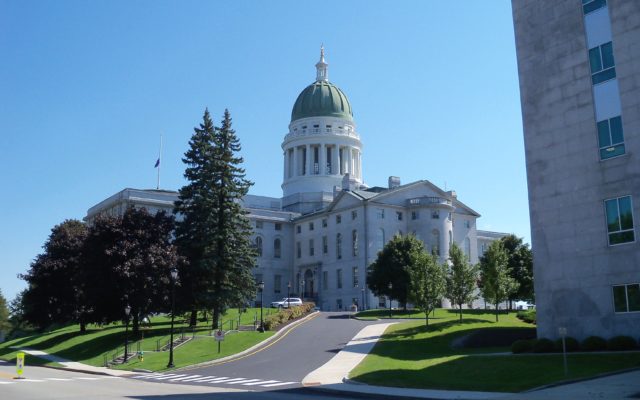
Overspending and failing to prioritize for basic needs
House Republicans remain concerned that excessive spending, combined with a lack of true priorities, will result in hardship and tax increases down the road.
Democrats created a state budget that is 11 percent higher than the last one.
It spends close to $1 billion more and was put together with one-time surplus funds from the LePage years, in order to avoid a tax increase in 2020.
Republicans said it before and will say it again.
The budget is unsustainable in future years because its massive spending increases will require you to give the government more of your hard-earned money.
For months, Republicans have pointed out core priorities, such as our roads and bridges, nursing homes, and individuals with disabilities on wait lists, were not adequately addressed in the $8 billion dollar budget.
Republicans also pointed out that the budget stabilization fund, also known as, the “Rainy Day Fund, has less than half of what experts recommend.
This leaves Maine vulnerable if the economy slows, if there is a major emergency, or if expanded welfare and Medicaid spending starts to create new shortfalls.
Instead of taking care of these “needs,” Democrats spent your money on “wants” in the form of new programs and more bureaucrats.
Now, new revenue projections from a strong economy have made $126 million dollars in additional money available.
Of that, $46 million dollars are one-time monies.
The Governor recently released her proposed supplemental budget, outlining how she proposes that money be allocated. She adds 127 new positions and once again, spends all but $6 million or so, ensuring that the next biennial budget, by their own estimation, will begin at $8.12 billion before any built in increases or new spending is added.
Here is how it compares with the “needs” House Republicans have highlighted:
Rainy Day Fund:
Republicans have been critical of spending without setting aside funds to address emergencies and shortfalls. The Governor’s proposal to commit $20 million more to the Rainy Day Fund comes from an account transfer which potentially jeopardizes funding for DHHS, clean drinking water, and roads and bridges. At a time with additional revenue, why is the Governor taking funds from DHHS, clean water, and the roads?
Roads and bridges:
According to the Maine DOT, our transportation system is underfunded by $232 million annually.
The administration recently stated that MDOT is “managing the decline” of our transportation network.
In the face of this, the Governor has proposed earmarking only $10 million of her supplemental budget to address her call to “fix the damn roads.”
A blue ribbon commission on transportation funding says that $160 million is needed just to address 2/3rds of the projected shortfall. The transportation commissioner recently stated that he has the capacity to spend $50 million in 2020.
$10 million dollars is clearly inadequate in the face of a projected $232 million annual shortfall.
Nursing homes, assisted care facilities and direct care workers:
The Governor did not designate any money to address the crisis affecting nursing homes and assisted living facilities.
In 2018, 6 nursing homes closed. Recently, Home Care for Maine, a 350 employee, non-profit agency providing services to 500-600 seniors throughout Maine closed.
If not addressed, low reimbursement rates and the rapid increase in the minimum wage will likely result in more closures going forward. This would place some of our most vulnerable citizens at risk.
Waitlists for individuals with disabilities:
The Governor proposes to eliminate the Section 29 waitlist for disabled people with the most severe need for services. The Section 29 waiver provides both in-home and other supportive services for these clients.
Though we applaud the Governor for this step, Republicans want a comprehensive approach that addresses the wait list population more effectively, and in a sustainable manner. The Governor’s budget also does not address Sec. 21 wait list nor is workforce addressed.
No doubt, listeners can point to other “needs” that have been neglected.
That illustrates the folly of spending every available dollar without covering the basics.
Recent developments are beginning to cast doubt on Democrat claims that they passed a sustainable budget that does not raise taxes.
- According to a recent news account, a federal draft rule change could result in a $150-$525 million dollar shortfall in the Medicaid account in the next two-year budget.
- The Commissioner of Health & Human Services just reported that the percentage of federal dollars supporting the state Medicaid program continues to decline. The effect of the reduction in the Federal Medicaid Assistance Percentage (FMAP) for eleven programs is at least $3.6 million.
- The Supplemental Budget relies on the passage of a digital streaming service tax (LD 2011) that will net $3.7 million dollars in revenue in 2021 and up to $6 million by 2023, according to Maine’s finance department. Democrats will tell you it is an “adjustment” not a tax increase. If you have not paid money to the state before, but now do, that is a tax increase.
To paraphrase former British Prime Minister Margaret Thatcher:
“We are running out of other people’s money.”
Maine Democrats are on track to “run out of other people’s money.”
Rep. Steven D. Foster serves the residents of Charleston, Dexter, Exeter, Garland and Stetson in the Maine House of Representatives. He is assigned to the Joint Standing Committee on Energy, Utilities and Technology. Previously, he served as a member of the SAD 46 school board from 2000 to 2012. This column is adopted from the GOP Weekly Radio Address.
